In response to the COVID-19 pandemic, Australia's international border has effectively been closed since 20 March 2020 when it initiated an emergency period under The Biosecurity Act 2015 . This restricts most travellers from entering and leaving Australia unless they meet a Travel Exemption.
Travel Exemptions are currently available under limited circumstances, such as Critical Work and Compassionate Cases. Some individuals are required to apply for a Travel Exemption while others can access an automatic exemption – here's what you need to know about entering and leaving Australia during the COVID-19 pandemic.
Inbound Travel Exemptions | Travelling to Australia
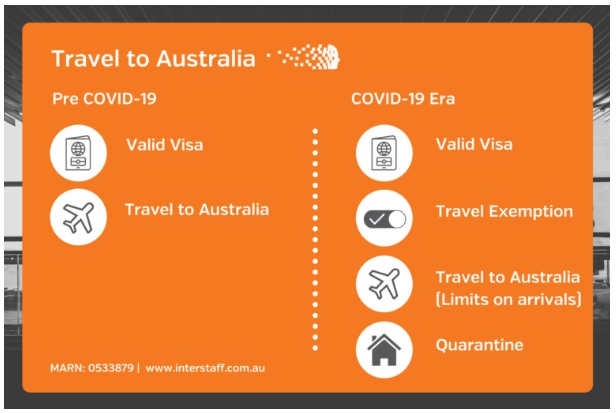
As you can see above, Inbound Travel Exemptions have added a separate stage of approval to the visa process for travellers to Australia.
Applying for an Inbound Travel Exemption to come to Australia
Individuals in the below categories can apply for an exemption from the travel restrictions:
- A foreign national invited by the Government to assist in the COVID-19 response;
- A foreign national whose entry would otherwise be in the national interest, supported by the Government;
- A person providing critical or specialist medical services, including air ambulance, medical evacuations and delivering critical medical supplies;
- A foreign national with critical skills or for work in a critical sector:
-
- Critical Sectors include:
-
- Large scale manufacturing
- Financial technology
- Film, media and television production
- Emerging technologies
- Critical Skills include:
-
- Medical technology
- Critical infrastructure
- Telecommunications
- Engineering and mining
- Supply chain logistics
- Aged care
- Primary industry
- Agriculture
- Food production
- Maritime industry
- A person providing critical skills in religious or theology fields
- A foreign national sponsored by an employer to work in Australia in an occupation on the Priority Migration Skilled Occupation List (PMSOL)
-
- Occupations currently on the PMSOL include:
-
- Chief Executive or Managing Director
- Construction Project Manager
- Mechanical Engineer
- General Practitioner
- Resident Medical Officer
- Psychiatrist
- Medical Practitioner nec
- Midwife
- Registered Nurse (Aged Care)
- Registered Nurse (Critical Care and Emergency)
- Registered Nurse (Medical)
- Registered Nurse (Mental Health)
- Registered Nurse (Perioperative)
- Registered Nurses nec
- Developer Programmer
- Software Engineer
- Maintenance Planner
- Social Worker
- Military personnel;
- A student completing year 11 and 12, with relevant Government support – conditions apply;
- A student in final years of study of a medical, dental, nursing or allied health profession university degree – conditions apply;
- A person who resides on a vessel that seeks a safe port – conditions apply;
- Persons travelling for compassionate and compelling reasons.
Automatic Travel Exemptions to Come to Australia
Persons in the below categories are automatically exempt from Australia's international travel restrictions and do not have to apply for a Travel Exemption to come to Australia:
- Australian Citizens;
- Permanent Residents of Australia;
- Immediate family members of an Australian Citizen or Permanent Resident;
- New Zealand Citizens usually resident in Australia and their immediate family members;
- A person who has been in New Zealand for 14 days or more immediately prior to arrival by air in Australia;
- Diplomats accredited to Australia (holding a Subclass 995 visa);
- Travellers transiting Australia for 72 hours or less;
- Airline crew;
- Maritime crew including marine pilots;
- Persons recruited under the Government-approved Seasonal Worker Program or Pacific Labour Scheme;
- Business Innovation and Investment (Subclass 188) Visa holders.
Travellers should carry evidence that they meet one of the above categories.
Immediate family members who do not hold a Partner or Child Visa must provide evidence of their relationship to the Department of Home Affairs to travel.
Prospective Marriage (Subclass 300) Visa holders will need to request an exemption.
What Employers and Skilled Visa holders should consider
The impact of international travel restrictions means it is not possible for skilled workers to travel to Australia from overseas unless evidence is provided to demonstrate 'Critical Work' requirements.
Employers should seek to understand when an Exemption for Critical Work may be possible by considering the below:
- Whether the business:
-
- Operates in a Critical Skills sector;
- Requires a worker with Critical Skills;
- Or requires a worker with an occupation on the PMSOL .
- Consequences and detriment to the business if the worker cannot travel;
- Reasons why the worker is required from overseas – eg, the highly specialised nature of the work;
- Details of the project – eg, why travel is needed immediately;
- Estimated value of the work to the business;
- Impact of the worker's travel to the economy – eg, the creation of local jobs.
Travel Exemptions are at the discretion of the Australian Border Force (ABF) Commissioner and refusals can cause delays. Applicants should provide supporting evidence to explain their request.
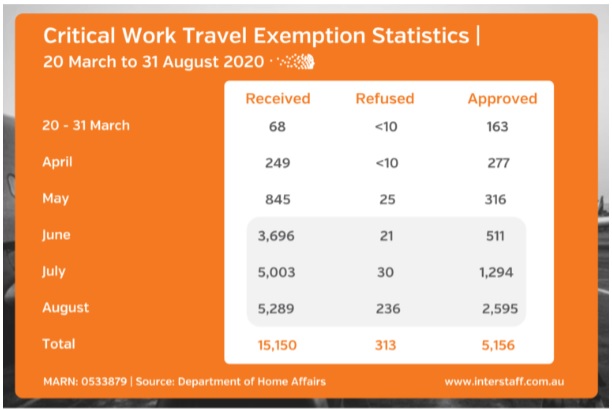
As you can see above, the ABF Commissioner began to approve Travel Exemptions for Critical Skills at an increased rate since July 2020, however this is not in direct proportion to the number of applications received.
It is worth noting that:
- Applications for Critical Skills also increased since June.
- Around 10,000 of the 15,000 received applications had no recorded decision at the end of August.
- It appears the Department was receiving just over 5,000 exemption requests for Critical Work per month in July and August.
Employers and visa applicants/holders may wish to plan for delays associated with obtaining Travel Exemptions (at international, state and regional borders as applicable), as well as limited flight availability and quarantine requirements.
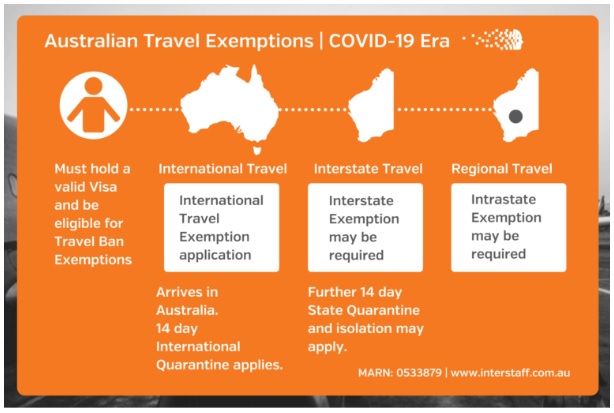
What Family Visa holders should consider
Unfortunately, many families are still be separated from their loved ones at this time.
As seen below, while the number of approvals for Compassionate reasons increased in July, the number of refusals and received applications also increased.
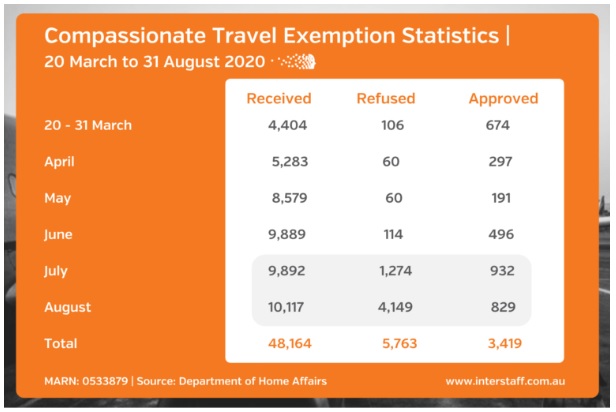
As a guide, Travel Exemptions have previously been granted for Compassionate reasons for the below types of cases:
- Urgent or critical medical treatment in Australia;
- Cases involving separation of minors from their family unit;
- Cases demonstrating strong, compassionate circumstances with the potential for serious, ongoing and irreversible harm and continuing hardship to a person lawfully in Australia including:
-
- Attending funerals of close family members;
- Visiting a close family member who is seriously or critically ill, with little support in Australia;
- Travel for the partner of a person who is in Australia (including Temporary Visa Holders) and in the final trimester of pregnancy or due to give birth.
Circumstances outside of the above may be considered. Travel Exemptions are assessed by the ABF Commissioner on a case-by-case basis and evidence should be provided.
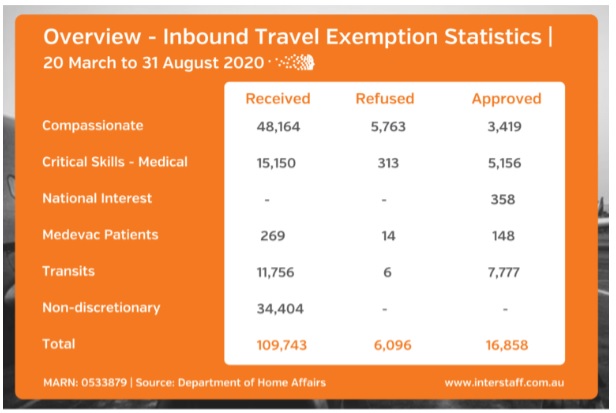
Applying for an Inbound Travel Exemption to Come to Australia
The ABF Commissioner has stated that it generally expects a person to have been granted a visa before applying for a Travel Exemption.
However, a person that meets the Critical Skills criteria can apply for an exemption beforehand. In our experience, visas have generally been granted to applicants that can obtain a Travel Exemption to enter Australia for Critical Work.
An exemption application should include sufficient supporting evidence and be lodged at least two weeks, but not more than three months before the planned travel.
It is possible that the categories for Travel Exemptions may broaden as Australia responds to new and emerging economic and social needs.
What if an Inbound Travel Exemption cannot be obtained?
There is no limit to the number of times you can apply for a Travel Exemption, however more detailed evidence should be provided in subsequent applications – you may wish to seek advice before re-applying.
Businesses with labour needs that do not meet Critical Work requirements may wish to consider options to engage visa holders that do not need a Travel Exemption – eg, visa holders already in Australia.
What about Outbound Exemptions to Leave Australia?
With reportedly more than 11,000 Australians getting Outbound Travel Exemptions to head overseas each month, there are many reasons why a person may need to leave Australia – for example, for Compassionate circumstances or Critical Work overseas.
According to FOI data from the Department of Home Affairs, 105,028 Travel Exemptions were approved for people to leave Australia between 25 March and 31 December 2020 – here's a breakdown:
- Most Outbound Travel Exemptions were granted for overseas stays of at least three months (51,793 exemptions) followed by compassionate and compelling grounds (31,091 exemptions). Compassionate cases included the death or serious illness of a close family member and parents travelling for surrogacy, adoption or picking up a child from overseas;
- Urgent and unavoidable personal business was the third largest category with 11,686 exemptions granted;
- Critical industries and business travel secured 8963 exemptions;
- The smallest categories were Urgent medical treatment not available in Australia (882 exemptions), Response to the COVID-19 outbreak (438 exemptions) and National interest (175 exemptions).
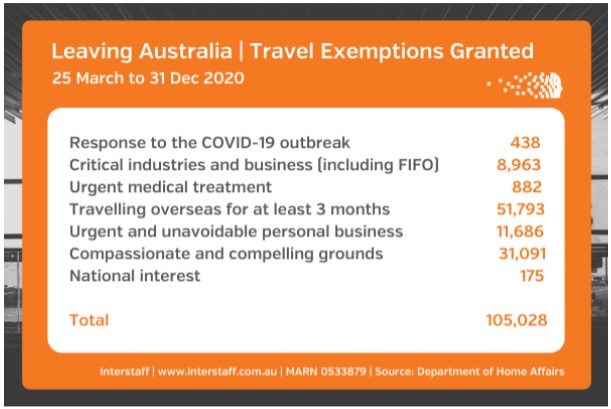
Outbound Travel Exemptions to Leave Australia
Australian Citizens or Permanent Residents must not travel outside Australia unless they meet an Outbound Travel Exemption to leave Australia.
Similar to Inbound Travel Exemptions, some individuals are required to apply for an Outbound Travel Exemption while others can access an automatic exemption.
Automatic Outbound Travel Exemptions
You may be automatically exempt from travel restrictions and leave Australia without applying for an exemption if you are:
- Ordinarily resident in a country other than Australia – generally this means you spent more days outside Australia than inside the country for the last 12 to 24 months
- An airline, maritime crew or associated safety worker
- A New Zealand citizen holding a Special Category (subclass 444) visa, even if you are usually resident in Australia
- Engaged in the day-to-day conduct of inbound and outbound freight
- Travelling in association with essential work at an offshore facility in Australian waters
- Travelling on official government business (including members of the Australian Defence Force and any Australian Government official travelling on a diplomatic or official passport)
- Travelling directly to New Zealand and you have been in Australia for 14 days or more immediately before your travel date
Applying for an Outbound Travel Exemption to Leave Australia
You must apply for an Outbound Travel Exemption if your travel is:
- Part of the response to the COVID-19 outbreak, including aid provision
- For a business/employer
- To receive urgent medical treatment not available in Australia
- To leave Australia for a compelling reason for three months or longer (a statutory declaration must be provided)
- Based on compassionate or humanitarian grounds
- In the national interest.
Supporting evidence is required. You may wish to seek professional advice if you are unsure if you meet the requirements.
The content of this article is intended to provide a general guide to the subject matter. Specialist advice should be sought about your specific circumstances.
